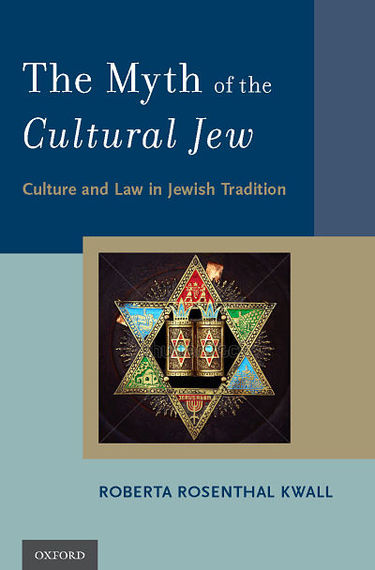
Being Jewish is more than bagels and lox and Seinfeld. But for many Jews, especially American Jews, the concept of cultural Jewry is often delineated from Jewish law and practice.
Roberta Rosenthal Kwall, a professor of law at DePaul University College of Law, makes a cogent case in The Myth of the Cultural Jew, Culture and Law in Jewish Tradition (Oxford University Press), that the two cannot be separated.
And it's a provocative and fascinating argument.
Her research is extensive and reveals the foundation of values and mores Jews assume are strictly cultural -- as opposed to cultural infused with religious law. Per the Pew Report, identifying as Jewish is important to many U.S. Jews, though they disagree about the extent of religious practice vs. ethnic identity. Even those who claim religion isn't important will faithfully observe a Passover Seder or fast on Yom Kippur.
The tricky part is what defines "identity." Some separate religion from ethnicity; others embrace Judaism as a religion and culture.
Such tensions are explored in Kwall's meticulously researched book, which covers Jewish law, cultural analysis, biblical history, women, Israel and identity in a post-Holocaust world.
She tackles the notion of the "cultural Jew," which implies one is "not religious but identifies as Jewish from a cultural standpoint," and neatly challenges that assumption. "Cultural Jews" are shaped by Jewish tradition, which includes Jewish law. All are intertwined; together, she argues, they define the "cultural" in cultural Jew.
Even if the majority of American Jews don't know it.
The codependent relationship of identity is based in mesorah -- the nexus of Jewish tradition that includes both a legal system, halakhah, and a set of cultural practices.
Analyzing that reality is the subject of Kwall's important book. She details the Written Law and Oral Law as it pertains to interpreting Torah, which ultimately determines behavior and values. And her parsing goes a long way to explaining the preponderance of Jewish lawyers.
(Clearly, cultural attitudes are not separate from law and tradition. The historic liberal sensibility of Jews is based on Talmudic rules about social justice and social welfare. That plays out in the Jewish response to secular issues of civil rights, feminism and marriage equality.)
Bottom line: the underpinnings of modern Jewish identity are nothing if not complex.
To pretend a separation between culture and law is historic, rather than linguistic, is a fallacy. Why? Jewish law was and is influenced by the surrounding culture. For example, in the medieval period, a believing Jew would never deny the Torah came from heaven. Fast-forward to the Enlightenment of the 18th and 19th-centuries, which brought Jews the option of greater participation in Europe, and subsequently America, a transformative event.
Jewish interactions with the secular world gave rise to the various denominations: Reform, Conservative and Reconstructionist Jewry. Reform Judaism is a reaction to the Orthodox; the Conservative movement is an American creation, bridging the Reform and Orthodox. All are part of the vibrancy of identity.
Today, that influence is part of the foundational conflict between denominations, notably in Reform Judaism's departure from matrilineal descent, which is part of the 21st-century's Jewish fight for survival. Or in layman's terms: Who is a Jew? is a distinctly different question from "What is a Jew?"
What complicates identity now is uniquely modern challenges. The Jewish community is coping with assimilation and intermarriage, as well as the rise of anti-Semitism, now at pre-Holocaust levels in Europe, and sadly prominent on many college campuses.
Because Kwall is a lawyer, she expertly marshals her facts -- and her thesis is persuasive. The intersection of law, tradition and culture on Jewish identity is enormous. Her approach may be academic, but the execution is rendered in a thoughtful and articulate narrative.
The Myth of the Cultural Jew explores the creative tension of modern Jews with understanding, yet keeps a cool eye on real-world dynamics. Well-written and compelling, the book should be required reading at universities and centers of Jewish learning. It's an invaluable guide to how various forces shape the Jewish psyche.
Plus, it asks tough questions about how Jews define themselves. Is it necessary to distinguish ethnic or religious beliefs vs. accepting the gestalt?
Kwall is to be applauded for a scholarly examination of one of the most intriguing issues in life: identity.
